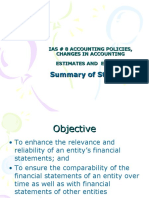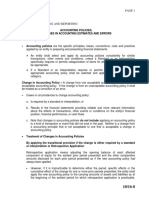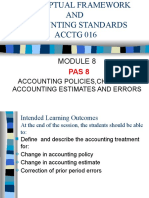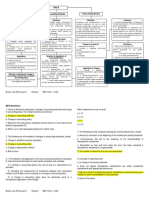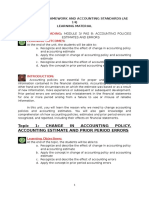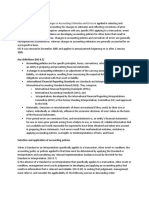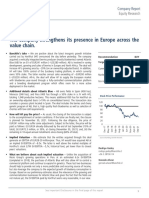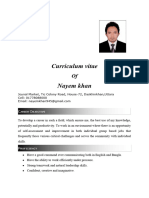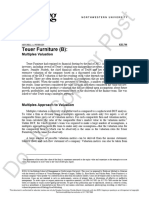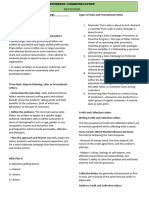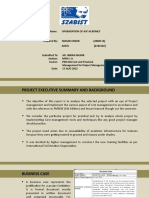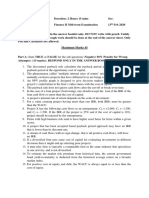Chapter 5 PAS 8 – Accounting Policies, Changes in IFRSs is accompanied by guidance to assist entities
in applying their requirements. Guidance that is an
Accounting Estimates and Errors integral part of the IFRS is mandatory while guidance
This standard gives spirit to the enhancing qualitative that is not an integral part of the IFRS is not.
characteristic provided by the new conceptual framework, If there is no IFRS that can be applied to a
comparability. particular transaction, management shall develop and
apply an accounting policy that is ; relevant and
Comparability Vs. Consistency reliable.
Other sources of guidance in the absence of IFRS
Helps to achieve are the following ( in descending order) ;
Goal the goal
IFRS dealing with similar and related issues
Definition, recognition criteria and measurement
concepts provided by the New Conceptual
Accounting Estimates Framework
Recent pronouncements of other standard setting
“Is an approximation of the amount to be debited or bodies that use similar conceptual framework.
credited in items for which no precise means of
measurement are available”, example of items that needs Note, the new framework is not a standard if there’s a
estimation includes; doubtful accounts & warranty costs. conflict between the two ,IFRS will still prevail.
There is a revision of estimate when the circumstances where Changes in accounting policy – It is the
the ground of estimation was based upon, changed. change in the measurement basis applied.
Example, Change in the method of inventory
Changes in Accounting estimates – It is an adjustment pricing ; from FIFO to weighed average method
to the measurement of an asset’s carrying amount,
Change in accounting policy is allowed when;
liability and periodic consumption. Example; changes in
estimation of useful life. Required by an IFRS
The change will result to a more relevant and
Note that a correction of prior period error is not a change in
reliable information financial position, financial
estimate.
performance and cash flow of the entity.
Changes in accounting estimates are to be handled currently
When new standards with new requirements are
and prospectively if necessary. Thus, it can be recognized
issued, reporting entity must adhere to the new
prospectively by including it in the profit or loss of the period
requirements.
affected by change.
It is not a changes in accounting policy when;
Accounting Policies
The application of an accounting policy for
Accounting policies – Principles use to prepare financial transactions that differ in substance from the
statements. Such as subsequent measurement for PPE; cost previously occurring transactions.
model , Fair value model, Revaluation model. The application of accounting policy for transaction
that didn’t occur previously.
An entity is required to apply the same accounting policies
for each period to achieve accountability. The change would be applied ;
Accounting policies applied to the transaction shall be In accordance with transitional provisions of the standard,
determined by the IFRS. IFRSs set out standard that the IASB (Applied when, IFRS contains transitional provision).
declared to lead to relevant
� Retrospectively (Applied when, the company changes For each statement line affected and for basic and
the accounting policy voluntarily or the IFRS doesn’t diluted earnings per share.
contain a transitional provision). The amount of the adjustment relating to periods
Prospectively from the earliest period practicable before those presented , to the extent practicable.
.(Applied when, it is impracticable to apply the (If retrospective application is impracticable)
retrospective application). An explanation and description of how the
change in accounting policy was applied.
Prospective application means that new accounting policy
is applied to events, transactions and conditions happened Change in accounting policies due to voluntary
after the date of change. change must disclose;
Retrospective application means adjusting the opening The nature of change in accounting policy.
balance of each affected component of equity for the earliest Reason why applying the new accounting policy
prior period presented and the other comparative amounts , as provides a more relevant and reliable information.
if the new accounting policy had always been applied. For the current and period presented to the extent
practicable the amount of adjustment;
Retrospective application becomes impracticable when an
entity cannot apply it after reasonable effort to do so. For each statement line affected.
Example, the monetary change is unidentifiable. For basic and diluted earnings per share
( only if the entity is applying PAS 33).
If there is a change in accounting policy which is to be applied Amount of adjustments pertaining to years before the
retrospectively the standard requires that the entity must comparative period presented.
present third financial position, dated at the beginning of the (if impracticable to determine the period –specific
earliest period presented. effects) disclose the circumstances which make it
impracticable and a description as to how and when
Prior period errors are omissions and misstatements in does the new policy applied.
financial statements. It includes misusage of data and
miscalculations. Disclosures with respect to prior period errors;
Prior period errors shall be corrected retrospectively by The nature of the prior period error.
adjusting the opening balances of affected accounts (e.g. The amount of correction for each prior
retained earnings, equipment ,accounts receivables ). period presented to the extent practicable;
For each financial statement line
If comparative statements are presented then make a item affected.
Retrospective restatement, it is correcting the recognition
For basic and diluted earnings per
measurement and disclosure of amounts elements of financial
share.
statements as if prior period error never occurred.
The amount of correction at the beginning
Disclosures of the earliest period.
Change due to requirement in IFRS must If retrospective restatement is impracticable
for the period, disclose the circumstances
disclose;
that made it that way.
Title of the IFRS
The nature of change in accounting policy.
A description of the transitional provisions. Then the
fact that the change in accounting policy was made in
accordance with the transitional provisions.
Transitional provisions that may have an effect on the
future periods (when applicable).
The amount of the adjustment for the current and
each period presented to the extent it is practicable;



